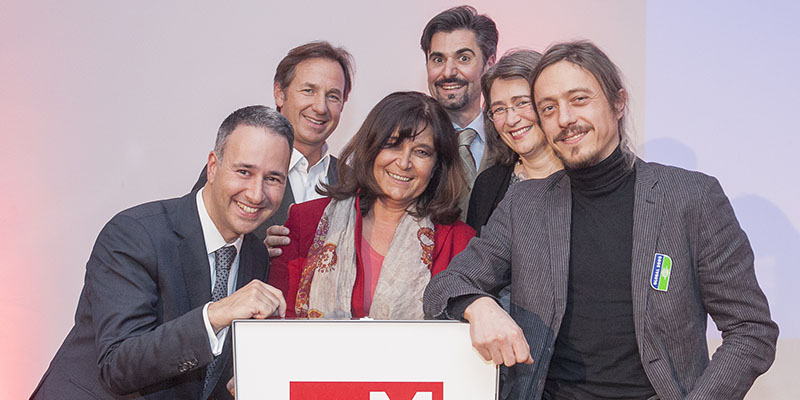''Sustainability in the gastronomy industry : a question of survival or hype?''
March 02, 2015
The ''Kahlenberger Gespräche'' discussion series at MODUL University Vienna offers up critical analysis of current business issues on a twice-annual basis. The most recent panel discussion on February 19th brought together renowned experts to discuss what developments are expected in the area of sustainability in the gastronomy sector, how best practice examples can be implemented, and how responsible management can help.
The megatrend "sustainability" in the food sector involves not only consumers, producers and retailers, but also increasingly catering. The latest figures show that in Austria alone, much can be done to reduce food waste: every year 200,000 tons of food is thrown away by large scale kitchens, cafeterias, catering, and hotel kitchens.
Hani El Sharkawi, head of MODUL Career, explains the intention behind the discussion series: ‘’The Kahlenberger Gespräche series highlights current and future trends in economic and social responsibility. Our goal is to draw attention to the relevance of sustainability for stakeholders and the general public, strengthen our competence center for international management, new media technology, sustainable development, and tourism and hospitality management.and fulfill the mission of MODUL Career as a networking platform for alumni and business partners.
Guest speakers from different fields and specializations were invited to bring their input to the discussion floor.
‘’Sustainability in gastronomy means thinking outside the box’’ said moderator Dr. Margit Leuthold, social scientist, Protestant theologian, former managing director of ‘’respect – Institute for Integrative Tourism and Development,’’and hospital pastor, with expertise in the field of ecotourism and sustainable regional and tourism development.
MU’s Dr. Dagmar Lund-Durlacher, Dean of the Undergraduate program and sustainability expert, explained in her evening’s introductory talk that the demand for ‘green’ cuisine in different areas will rise, ‘’whether organic, fair trade, vegetarian or vegan - more and more people are changing their eating habits in daily life. The hospitality industry is already attuned to this, and will continue to strengthen their efforts.’’ However, many experts agree that a lot of education and awareness is still necessary. "When designing the menu, factors such as the purchase of environmentally-friendly and resource-efficient food, the reduction or avoidance of food waste, the establishment of regional supply chains, and much more must be taken into account. These are areas that are not necessarily rooted in the minds of restaurateurs and still need innovative solutions’’.
Markus Hübl, MAS, spokesman for ‘’Wiener Tafel’’ and communications expert specializing in socially relevant issues, outlined solution models for sustainable gastronomy from the perspective of environmental and social clubs.
"Gastronomy is an industry in which the use of food as a resource is of vital importance. Here sustainability means primarily paying attention to the selection of sustainably-produced foods, the processing of them, and running an environmentally sustainable logistics operation which involves the prevention of food waste.’’
His company offers plastic containers called the ‘TafelBox’ to be used at catered events, cafeterias, or other places where the amount of food prepared cannot always be consumed. The leftover food can be taken home in a Tafelbox and eaten at a later time to save it from being thrown into the garbage. MODUL University Vienna has implemented this concept at functions and in the university’s cafeteria.
Martin Wildenburg, PhD, board member and expert from the sustainability team Global 2000 underpinned the need for new business models. ‘Development of sustainable business models which are oriented towards helping the economy of the common good such as the ‘’Pay as you like’’ model should be encouraged. Positive flagship projects for sustainable food, such as the ongoing ‘’Schenk mir dein Problem!", should help to find solutions for the smaller and larger environmental issues of daily operations, as well as best practice examples for the Green-Gastro branch.’’
Well-known Viennese restaurateur Mario Plachutta – owner of several restaurants in Austria’s capital city - stressed the critical aspects of the topic: "Sustainability is often used as a capitalist move with a clearly defined target audience -young, educated - that often has very little to do with the environment’’. In addition Plachutta explained, ‘’responsibility starts with the consumer. As long as the consumer chooses to eat unsustainably-produced meat, statistics don’t matter.’’
Photographer: Martin Lusser) L-R.: Hani El-Sharkawi,Mario Plachutta, Prof. Dr. Dagmar Lund-Durlacher, Markus Hübl, MAS, Dr. Margit Leuthold, amd Martin Wildenberg, PhD





